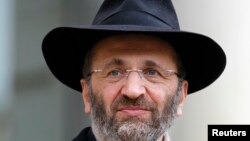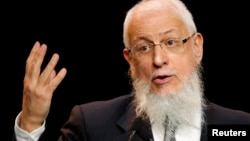PARIS —
The search is on for a new chief rabbi to lead Europe's largest Jewish community, after Grand Rabbi Gilles Bernheim of France took leave from his post following a plagiarism scandal. The issue is dividing France's 600,000-member Jewish community.
At his Paris apartment, Rabbi Yeshaya Dalsace showed a visitor mementos from his ancestors: Jews from eastern France. Dalsace comes from a long line of Ashkenazi Jews from Eastern Europe who traditionally led French Judaism. France's top rabbi, Gilles Bernheim, shares those same ethnic origins.
But that's where the similarities end. Dalsace belongs to the more centrist Conservative branch of Judaism. Bernheim is an Orthodox Jew, the branch that now dominates French synagogues and leadership structure.
That structure was shaken earlier this month, when Bernheim took leave from his post as grand rabbi of France, after admitting to plagiarizing certain texts and not being truthful about his academic credentials.
Disappointment
Dalsace said Bernheim's departure has disappointed many practicing Jews. They had high hopes that Bernheim would change many things, including the Central Consistory, the chief religious authority that gathers hundreds of synagogues in France and its overseas territories. Critics say the consistory is slow to reform and to respond to practical issues facing Jews today, like mixed marriages.
A bookish intellectual, Bernheim is viewed as embracing a more "modern" strain of Orthodox Judaism. He has spoken out often against anti-Semitism in France and has been a leader in inter-faith dialogue.
Martine Cohen, a specialist on Judaism at the Group on Society, Religion and Secularity, a Paris-based research organization said that despite his strong Orthodoxy, Bernheim attracted a certain consensus among intellectuals, and even among some non-practicing and non-believing Jews. Cohen added that he advocated the need to be open to current issues facing society.
Change
Judaism in France has changed dramatically over the last few decades. During the 1950s and '60s, tens of thousands of Sephardic Jews from North Africa immigrated here. They were more traditional than many of France's Ashkenazi Jews. France's previous grand rabbi, Tunisian-born Joseph Sitruk, personified this change.
But in 2008, Bernheim took over the top post from Sitruk, after a hard-fought campaign.
According to Cohen, that campaign underscored the two currents of Orthodox Judaism in France. The one embraced by Bernheim, she said, is open to inter-religious dialogue, social issues and women's place in the religion. The other, an "ultra-Orthodox" current embraced by Sitruk, is more inward looking.
Cohen believes these competing visions will again come to the fore as French Jews search for a new top rabbi.
Support
One of Bernheim's supporters is Nathalie Cohen-Beizermann, who holds senior posts in several Jewish organizations.
Cohen-Beizermann said Bernheim has done enormous things for the Jewish community. He advanced the status of Jewish women, in terms of religious divorce and other matters. He also helped organize a women's study center and supported a campaign to fight violence against women within the community.
Ultra-Orthodox Lubavitch Rabbi Mendel Azimov praised both Bernheim and his predecessor, Sitruk.
"Both were great. Both had advantages," he said. "One [Sitruk] was closer to the nation. The other [Bernheim] was a little further, but gave very strong statements."
Azimov said he would be happy if either type of personality became the next grand rabbi.
But Dalsace is disappointed in Bernheim. He opposes the grand rabbi's strong and public opposition to the French government's plans to legalize gay marriage. He believes the Jewish leadership should not take a stance on political issues.
Dalsace said Bernheim's views are all the more surprising since the grand rabbi initially reached out to gays within the Jewish community. Dalsace believes this kind of reaching out is necessary, if France is to build a more open and inclusive brand of Judaism. But he does not think this will happen.
The Central Consistory said elections for the next grand rabbi will not be held for at least six months. It is also unclear whether Benheim can or will return to his post, as some Jews hope will happen.
At his Paris apartment, Rabbi Yeshaya Dalsace showed a visitor mementos from his ancestors: Jews from eastern France. Dalsace comes from a long line of Ashkenazi Jews from Eastern Europe who traditionally led French Judaism. France's top rabbi, Gilles Bernheim, shares those same ethnic origins.
But that's where the similarities end. Dalsace belongs to the more centrist Conservative branch of Judaism. Bernheim is an Orthodox Jew, the branch that now dominates French synagogues and leadership structure.
That structure was shaken earlier this month, when Bernheim took leave from his post as grand rabbi of France, after admitting to plagiarizing certain texts and not being truthful about his academic credentials.
Disappointment
Dalsace said Bernheim's departure has disappointed many practicing Jews. They had high hopes that Bernheim would change many things, including the Central Consistory, the chief religious authority that gathers hundreds of synagogues in France and its overseas territories. Critics say the consistory is slow to reform and to respond to practical issues facing Jews today, like mixed marriages.
A bookish intellectual, Bernheim is viewed as embracing a more "modern" strain of Orthodox Judaism. He has spoken out often against anti-Semitism in France and has been a leader in inter-faith dialogue.
Martine Cohen, a specialist on Judaism at the Group on Society, Religion and Secularity, a Paris-based research organization said that despite his strong Orthodoxy, Bernheim attracted a certain consensus among intellectuals, and even among some non-practicing and non-believing Jews. Cohen added that he advocated the need to be open to current issues facing society.
Change
Judaism in France has changed dramatically over the last few decades. During the 1950s and '60s, tens of thousands of Sephardic Jews from North Africa immigrated here. They were more traditional than many of France's Ashkenazi Jews. France's previous grand rabbi, Tunisian-born Joseph Sitruk, personified this change.
But in 2008, Bernheim took over the top post from Sitruk, after a hard-fought campaign.
According to Cohen, that campaign underscored the two currents of Orthodox Judaism in France. The one embraced by Bernheim, she said, is open to inter-religious dialogue, social issues and women's place in the religion. The other, an "ultra-Orthodox" current embraced by Sitruk, is more inward looking.
Cohen believes these competing visions will again come to the fore as French Jews search for a new top rabbi.
Support
One of Bernheim's supporters is Nathalie Cohen-Beizermann, who holds senior posts in several Jewish organizations.
Cohen-Beizermann said Bernheim has done enormous things for the Jewish community. He advanced the status of Jewish women, in terms of religious divorce and other matters. He also helped organize a women's study center and supported a campaign to fight violence against women within the community.
Ultra-Orthodox Lubavitch Rabbi Mendel Azimov praised both Bernheim and his predecessor, Sitruk.
"Both were great. Both had advantages," he said. "One [Sitruk] was closer to the nation. The other [Bernheim] was a little further, but gave very strong statements."
Azimov said he would be happy if either type of personality became the next grand rabbi.
But Dalsace is disappointed in Bernheim. He opposes the grand rabbi's strong and public opposition to the French government's plans to legalize gay marriage. He believes the Jewish leadership should not take a stance on political issues.
Dalsace said Bernheim's views are all the more surprising since the grand rabbi initially reached out to gays within the Jewish community. Dalsace believes this kind of reaching out is necessary, if France is to build a more open and inclusive brand of Judaism. But he does not think this will happen.
The Central Consistory said elections for the next grand rabbi will not be held for at least six months. It is also unclear whether Benheim can or will return to his post, as some Jews hope will happen.





